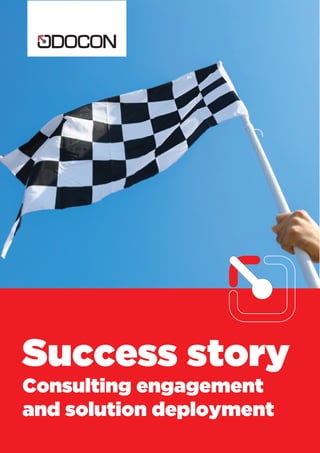ODOCON EMS Success Story
- 1. Success story Consulting engagement and solution deployment
- 2. Move to Real-Time Enterprise with Background The following points below offer a high level view of their situation before considering a change.  Multiple service providers at different locations  Schedules sent by employees on excel sheets once a week  Manual clubbing of employees and allocation of vehicles  Manual charting of who has used the services  Billing based on all these manual entries Key challenges  Scheduling in itself was a challenging exercise with a department administrator consolidating based on individual projects and preferences  Clubbing and allocation of vehicles were done by service providers’ representatives considering all interests other than the companies. Personal relationships and short sighted benefits dominated such decisions.  Absolutely no control over no shows and capacity utilization – All decisions were a postmortem  Multiple levels of leakages & pilferage because of multiple check and balance points – E.g. Paper duty slip signed by employees, cross checked against a security register, cross checked against the roster created etc.. Our engagement with them: We started with interviewing all stake holders like employees, administrators, numerous car rental service providers. The technical and management teams both spent a lot of time on the field to understand ground realities. After gathering deep insights on their existing prac- tices and key challenges the team met with the client decision makers and worked out a final set of objectives to be achieved as part of this initiative. With such critical input guided with ground realities the first prototype of ODOCON was implemented and went for real life testing in June 2014. This pilot was carried out for two months going through the complex and critical testing of GPS enablement. GPS was a relatively new technology at that point of time and the criticality came from the fact that it was embed- ded in business processes other than just track- ing a fleet. In those two months there were efforts to adapt the product to the core business objectives of the client organization. Later in 2015 after achieving a full proof end to end implementation ODOCON was further integrated with client’s core systems like HRMS and more specifically their attendance system. Continuous efforts went in to upgrade the product to make it user friendly for all communi- ties. Currently ODOCON is used for different business models and environments making it a platform. More than 2000 employees, ODOCON Every Day 500 trips and 9 locations use with an average utilization of 60% Client: A $900m company with more than 27000 employees and part of a $15billion group.


